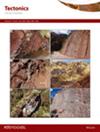波希米亚支脉对欧洲阿尔卑斯山东阿尔卑斯楔形地带的降温和排湿模式的影响
IF 3.6
1区 地球科学
Q1 GEOCHEMISTRY & GEOPHYSICS
引用次数: 0
摘要
褶皱带和推力带的结构可能受到下行板块基底几何形状的影响。由于普遍缺乏地下约束条件,以及在空间和时间上的剥蚀估算分辨率较低,这种影响很难评估。波希米亚支脉是阿尔卑斯山脉向喀尔巴阡山脉过渡的基底高地。它与前陆盆地的缩小和造山带尺度的走向变化相吻合。它位于世界上研究得最好的造山带之一,是了解基底地形如何影响褶皱带和推覆带构造的理想案例。然而,由于热时学研究主要集中在阿尔卑斯山的核心地区,因此对造山运动外围地区的掘起时间和掘起量的研究还很薄弱。我们展示了来自波希米亚支脉上方楔块的新磷灰石(U-Th)/He和裂变轨迹数据。热重置年龄监测到了迄今为止尚未被认识到的晚渐新世至中新世的明显冷却阶段,这与楔形扩展过程中的地壳增厚、隆起和侵蚀有关。大约 3-4.5 千米的明显隆起与楔形推进下的基底台阶有关。支脉充当了前陆推进推力的支撑,抑制了变形,核化了反形变堆积和双相堆积,从而导致了其上方的掘起。我们说明了次脱落地形的沿线和跨线变化如何影响楔的传播并控制褶皱和推力带的几何形态。对接效应是大部分掘起的原因,而深层板块动力学对楔状隆起的重要性则次之。本文章由计算机程序翻译,如有差异,请以英文原文为准。
The Impact of the Bohemian Spur on the Cooling and Exhumation Pattern of the Eastern Alpine Wedge of the European Alps
Fold and thrust belt architecture may be influenced by basement geometry of the downgoing plate. This influence is notoriously difficult to assess due to a common lack of subsurface constraints and low resolution of exhumation estimates in space and time. The Bohemian Spur is a basement high at the transition from the Alps to the Carpathians. It coincides with narrowing of the foreland basin and an orogen-scale change of strike. Its location in one of the best-studied orogens in the world makes it an ideal case for understanding how basement topography influences fold and thrust belt tectonics. However, since thermochronological studies were mainly focused on the core of the Alps, timing and amount of exhumation remain poorly constrained in these peripheral parts of the orogen. We present new apatite (U-Th)/He and fission track data from the wedge above the Bohemian Spur. Thermally reset ages monitor a so far un(der)appreciated phase of prominent Late Oligocene to Miocene cooling, associated with crustal thickening, uplift and erosion during wedge propagation. Pronounced exhumation on the order of 3–4.5 km can be related to basement steps beneath the advancing wedge. The spur acted as a buttress for foreland-propagating thrusting, pinning deformation and nucleating antiformal stacking and duplexing and thus exhumation above it. We illustrate how along- and across-strike changes of sub-detachment topography impact wedge propagation and control fold and thrust belt geometries. The buttressing effect accounts for most of the exhumation, while deep-seated slab dynamics are of subordinate importance for wedge uplift.
求助全文
通过发布文献求助,成功后即可免费获取论文全文。
去求助
来源期刊

Tectonics
地学-地球化学与地球物理
CiteScore
7.70
自引率
9.50%
发文量
151
审稿时长
3 months
期刊介绍:
Tectonics (TECT) presents original scientific contributions that describe and explain the evolution, structure, and deformation of Earth¹s lithosphere. Contributions are welcome from any relevant area of research, including field, laboratory, petrological, geochemical, geochronological, geophysical, remote-sensing, and modeling studies. Multidisciplinary studies are particularly encouraged. Tectonics welcomes studies across the range of geologic time.
 求助内容:
求助内容: 应助结果提醒方式:
应助结果提醒方式:


